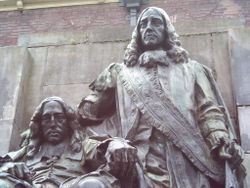| Johan de Witt (September 24, 1625, Dordrechtâ??August 20, 1672, The Hague) was a significant Dutch political figure.In 1650 he was appointed leader of the deputation of Dordrecht to the States of Holland, the same year stadtholder William II of Orange died. De Witt became, as raadpensionaris (Grand Pensionary), the factual leader of this governing body in 1653. Controlling Holland, the most powerful province, he ruled the Republic of the United Provinces as a whole. He applied his mathematical knowledge to the Republic's financial and budgetary problems.Johan de Witt brought about peace with England after the First Anglo-Dutch War with the Treaty of Westminster in the year 1654. The peace treaty had a secret annex, the Act of Seclusion, forbidding the Dutch ever to appoint William II's infant son as new stadtholder. He bolstered his policy by publicly endorsing the theory of republicanism. De Witt's power base was the wealthy merchant class. The people supporting him were called the "States faction", opposed by the "Orange faction" that was popular among the artisan class. This antagonism paralleled a division between moderate and intolerant Calvinists. In the period following the Treaty of Westminster the Republic increased in wealth and influence under De Witt's leadership. De Witt created a strong navy, appointing one of his political cronies, Lieutenant-Admiral Jacob van Wassenaer Obdam, as supreme commander of the confederate fleet. Later De Witt became a personal friend of Lieutenant-Admiral Michiel de Ruyter. The Second Anglo-Dutch War began in 1665, lasting until 1667 when it ended with the Treaty of Breda, in which De Witt negotiated very favorable agreements for the Republic after the partial destruction of the British fleet in the Raid on the Medway, originally conceived by De Witt himself. At that moment The Republic was one of the Great Powers, dominating world trade and thereby the wealthiest nation in the world.His pro-French policy however would prove to be his undoing. In the Dutch rampjaar (disaster year) of 1672, when France and England during the Franco-Dutch War (Third Anglo-Dutch War) attacked the Republic, the orangists took power by force and expelled him. Recovering from an earlier attempt on his life in June, he was assassinated by a carefully organised lynch "mob" after visiting his brother Cornelis de Witt in prison. He was decoyed into this trap by a forged letter, victim of a conspiracy by the orangists Johan Kievit and Lieutenant-Admiral Cornelis Tromp. He was killed by a shot in the neck; his naked body was hanged and mutilated and the heart was carved out to be exhibited. His brother was shot, stabbed, eviscerated alive, hanged naked, brained and partially eaten. The latter's heart was exhibited for many years next to his brother's by Dirck Verhoeff. Nowadays most historians assume that his adversary and successor as leader of the government stadtholder William III of Orange was involved. At the very least he protected and rewarded the killers. DeWitt |  |
